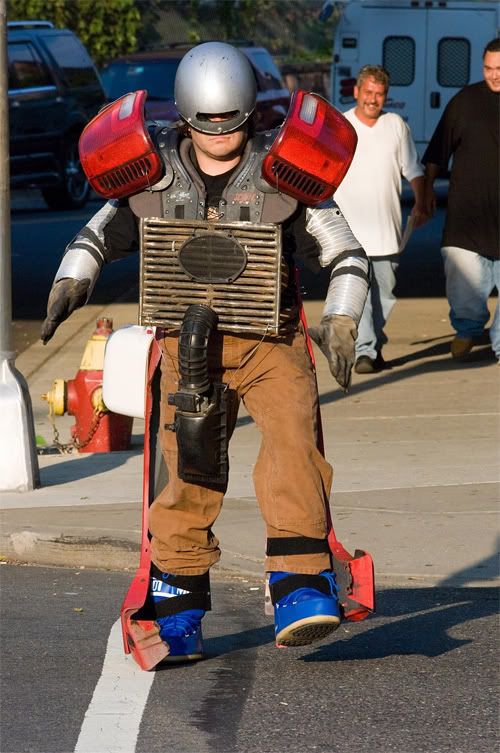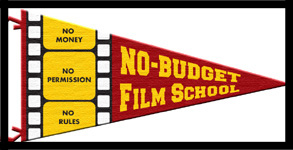|
As a teacher and student of no-budget filmmaking "theory," and as a producer in pre-production on another impossible-to-shoot-on-no-money
film, I'm really glad I saw "Be Kind Rewind" tonight. The Michel Gondry-directed film proved to be utterly inspirational. Not the movie itself, mind you--it was made for millions of dollars--but
rather the little films made within the film. For those of you living under a rock, (certainly none of you loyal Film Radarites),
the premise of the film is that Jack Black's character Jerry accidentally erases all of the VHS movies in the video store
managed by his friend Mike (Mos Def), and the two budding filmmakers scramble to replace the store's inventory with homemade
versions of the films they erased, which they shoot themselves on an old RCA VHS camera. Soon the entire community, who come
to love the new versions, become actively involved in the making of the films as well--think of it as user-generated video
if there were no internet and no YouTube. "Be Kind Rewind" ("BKR") has many valuable lessons to teach
us no-budget filmmakers...
 | | Jack Black's No-Budget RoboCop! |
1.) You Don't Need Money to Make Something That's "Good" and That Resonates with an Audience.
This of course is the overriding lesson of the film. In an age of generic, formulaic studio filmmaking, this lesson will
always continue to ring true.
2.) Production Value Is Overrated. I've said this in my classes a hundred times and I even wrote an article about it for Film Arts Magazine last year. The script and story are super important, the performances are super important, but the production value only
needs to be "good enough." Good enough works well enough. Some aspects of production value, such as good
production sound, are vitally important to certain films--dramatic, dialogue-heavy films for instance--so the bar for "good
enough" for production sound is high for this kind of film. Other aspects of production value, like costumes, may not
be as critical, so the actors wearing their own clothes may be good enough to work. The key idea to remember, and the one
that "BKR" illustrates so wonderfully, is that every good no-budget film has an organic evenness to it.
Perhaps, like with the little films within the film of "BKR," all the stunts, props, set pieces, etc. are of uniform
low quality. This can work! It's when you break the uniformity that the audience notices that the other elements are
in fact sub-par. Think of "Clerks" and it's production values, even the quality of its performances. They're
low quality, but it works, right? Now think of that exact same movie, but shot in 35mm anamorphic color--now it doesn't
work so much. (OK, I know what you're thinking--it becomes "Mallrats"!).
3.) A Small,
Committed Team with a Hell or High-Water Commitment is More Valuable Than Money. It takes people to make movies,
not money. Even if you have all the money in the world, you've got to pay people to make your movie--either because they
are going to work in it or on it, or they are going to rent or sell you something used to make it. So if you don't have
the money, but you've got the people, people who all share the same passion and drive to make the film, you're golden.
And just like in "BKR", it takes a village. Oftentimes, (unless you live in LA), you can enroll your community
to make a film. The no-budget "August Evening," winner of the Cassavetes Award at this year's Spirit Awards, was made with the help of the citizens of Gonzales, Texas,
who lent their establishments, donated props and costumes, cooked meals for the crew, and volunteered to work on the movie.
Oh, and guess what one of the ready-made audiences for the film is?
4.) There Are Always No-Budget Alternatives
to Any Piece of Gear. The amateur filmmakers in "BKR" fashion a variety of homemade surrogates for gear
they could never afford to procure. Need a crane shot? Mount the camera to the bucket of an excavator. Need a nice panning
shot, but don't have a tripod? Strap the camera to a rotating fan. OK, these techniques were used for comic effect,
but there are so many examples of creativity and ingenuity employed by these guys--make-shift sets, props, costumes, special
effects, stunts--that you begin to realize there is always another way to get something done. Yes, Virginia, when there's
a will, there's a way.
5.) Know Your Audience. The film demonstrates there's an audience
for everything. They may not be easy to find or easy to aggregate, but you should always be thinking: Who They Are, How
Many Are There, and How Easy Are They To Get. The great thing about this Core Audience for your film is,
they don't care how good your movie is. As long as it speaks to them, as long as it is compelling and authentic
to their own experience, they will enjoy it. And they'll tell their friends about it. Your core audience may be small,
but that's OK--you're making a no-budget movie. You don't need a huge audience to be fiscally responsible. And
if you can actually get your money back on your movies, then you can go out and make more. And that devoted audience will
follow you to the next movie. This idea is wonderfully realized in "BKR."
6.) Nothing Can
Replace The Theatrical Experience. Sure, cable and DVD's are nice--it's comfortable and affordable to watch
movies at home. But that doesn't compare to the experience of seeing a film on the big screen with an audience sharing
that experience with you. We're social creatures. Ultimately we long to connect with other human beings. Movies have
always been an incredibly powerful way to define and bind people. Sharing with strangers the emotions we feel when we watch
a movie give substance to those feelings, and turn those strangers around us into a community. Of course, this is exactly
what I am trying to do with my No Budget Film Club, define and build a community around no-budget films. You as filmmakers have the potential to create communities when you
make your films, and when we're all in the same room with each other enjoying your film, it's an incredibly satisfying
experience.
There are many other lessons we can take from "BKR" as filmmakers--go check it out and
discover a few of your own!
ARCHIVED EDITIONS OF THE NO BUDGET REPORT:
|

